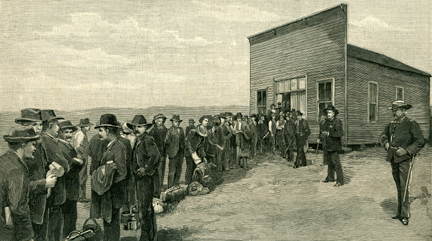
|
The 'Run of
1889' |
|
Also see the "Great Oklahoma Land Rush of 1889" - "Chills, Fever, Friends and Good Times" - "Big Flood of April 22, 1885" |
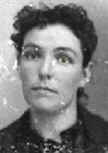 |
|
Laura Barnum |
Editor's note -- this memoir is about our family's role in the pioneer settlement of Oklahoma, often called the "Great Oklahoma Land Rush" or the "Run of 1889." It was authored by our cousin, the late Laura (Brown) Barnum, seen here, who with her parents staked their claim near the town of Kingfisher. The memoir later was printed in the Kingfisher Times, and is republished here with the permission of the family. Laura's sister, the late Nellie (Brown) Jones, also wrote her own account of the "Run."
The sun was just peeping over the eastern horizon when several covered wagons were seen to leave a town in southwestern Kansas and wend their way slowly down the slope toward the river to the southeast bound for the new country of Oklahoma, which was to be opened up for settlement on April 22, 1889.
The President had issued his proclamation that it should be on this date at 12 o’clock noon that all those who wanted to and had reached the age of 21 years, and had not used there homestead right would be allowed to enter what was then old Oklahoma Proper and file on 160 acres of land for the price of $14 for filing and should receive same free from the government to make homes on and the first to made settlement on a farm to be the rightful owner.
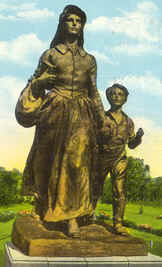 |
Famed
Pioneer Women |
Throngs of people were going to that country from all over the United States to seek homes either on farms on town lots in the new towns that would be built and were surrounding it on all sides, north, east, south and west.
The family my story is about was named Brown. Mr. Brown was a man about 55 years of age, well educated and refined, who had met with reverses in fortune and with his family was seeking a home in the new country.
He had with him on this trip his son Frank, 23 years of age, and the daughters, Nellie, 21 and Laura, 16 (Mrs. E. A. Barnum).
His wife and two younger children remained in Kansas with a married daughter.
Mr. Brown and his son and daughter who were of age expected to take claims if the could get them. His outfit consisted of two covered wagons and trailed a buggy and there were several neighbors and friends with wagons, about eight or 10 teams all together in the party.
As we came near the bridge that crossed the river a novel sight met our gaze, and old wagon with a tattered cover-drawn by an old black horse and a cow hitched together. The wagon was loaded with some household goods and a coop of chickens and behind the wagon trailed a two wheeled cart, made of the hind wheels of a wagon with a long box bred on it and in this cart sat the wife and several small children, the pet dog and cat all bound as we were for the new country. Many joking remarks were expressed by the young people of our party about the cow and horse outfit and wondered if they would get there in time for Christmas. But Mr. Brown reproved them and said they had better wait and see -- they might beat us yet little realizing how near he came to telling the truth.
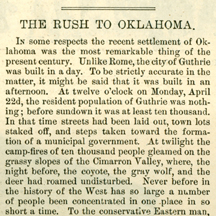 |
|
Harper's Weekly coverage of the Run |
Our Party was anxious to cross that evening for they knew by morning it would be impassable, so after talking the situation over they decided to cross and drove into the swollen stream.
They all crossed in safety, except the last wagon which was occupied by young Mr. Brown and his sisters. The water by this time was so high it was hard to keep the horses in the right path and when about the middle of the stream they got out of the path and struck quick sand and began to go down and the water by this time was up to the bottom of the wagon box. The team was soon exhausted trying to get out and gave up, and we began to think our time had come, but those who had crossed were watching, and several of the men were already on the way back with teams to help us, and soon had us out on dry land, although the men got a good wetting.
It had been a risky trip and all breathed a sigh of relief when it was over. This was the last wagon to ford the river for a week for by morning it was too high to ford and those on the north side had to make a raft to cross on.
We camped that night a few miles south of the river and in a day or two afterward. While crossing a small stream one of Mr. Brown’s wagons suffered a broken wheel. But there was a blacksmith in the company who had his blacksmith tools with him going to the new country to set up a shop in some new town, and as we were now in the timber belt, Mr. Brown soon had him at work with blackjack timber for repairs, fixing the broken wheel, but it delayed the party for a day and a half.
While we were camped here waiting for the wagon to be fixed the family driving the cow and horse we had passed the first morning we started came by and now passed us. The man said he had got to the river by the time the raft was done and crossed on that.
The blacksmith finished fixing the wheel that evening and we loaded up and started again and sometime the next day we overtook the cow and horse outfit and passed them.
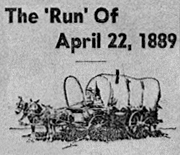 |
|
Kingfisher Free Press graphic |
But the young people didn’t laugh any this time for our situation began to look serious. Time was passing, roads were bad--some places none at all, only cattle trails. Our wagons were heavily loaded and we were still a long way from where we wanted to go.
All went well with us now for awhile until one afternoon we came to a cattle ranch just north of the Cimarron river and a little northwest of the nook of old Oklahoma proper that ran up to the northwest, north of the river. Here we found quite a crowd gathered, many covered wagons and several men on horse back, riding back and forth among them and it looked as if there was something wrong.
Mr. Brown stopped and got down from his wagon and went to where a group of men were talking and asked what the trouble was, and someone spoke up and said those men on horses were cowboys who had just came from across the river and said the Indians were on the warpath, and if we crossed the river we would all be massacred, but if we stayed here we would be safe and when the day of the opening came which was only a few days off) they (the cowboys) would locate all of us on good claims down in the nook of Oklahoma for $5.00 each.
When Mr. Brown heard this he just laughed and said, “a $5.00 Indian scare,” and after talking awhile with the cowboys he felt sure it was nothing but a money scheme, and turning to the men he said, “Why men, don’t you know that the soldiers are all up and down this line guarding this country? The Indians are not going to do anything right under their noses and I believe we are just as safe on the south side of the river as we are on the north. I’ve lived in this western country too long to be taken in by any such tale a this and I’m going to cross that river tonight and go as far as possible on my way for I have already been delayed and have just time enough to reach the line west of Kingfisher where I started for. If you men want to stay here and give these boys $5.00 all right. I won’t, I’m going on.”
Many begged him not to go and his daughters in the meantime while he had been talking with the men had been told all kinds of tales of the terrible things which had been reported to have happened across the river. They were frightened and begged not to go but he just laughed at their fears and climbing on his wagon he beckoned to his son to follow. They drove around the other wagons and went slowly down the hill toward the river.
When they reached the river bottom they looked back and nearly all the crowd was following. Only a few white-topped wagons remained at the ranch.
It was a large company that camped together that night a few miles south of the river in a grove of oak trees, nearly all strangers but still not strangers, for no one remains strangers long in a new country.
There were several young people in the company and the boys gathered wood for a bonfires and kept up fires, sang songs and told stories and kept up a regular revelry all night--said they were scaring the Indians away.
But it was no joke with some for there were many in the party that were really afraid. But not Mr. Brown. He slept all night the sleep of the just, and in the morning calmly remarked to the girls, “Well girls did you see any Indians last night? I thought I heard some war whoops in the night or was it the boys playing Indian?”
The next day we reached the line west of Kingfisher and never saw any Indians except a few friendly ones in their teepee homes.
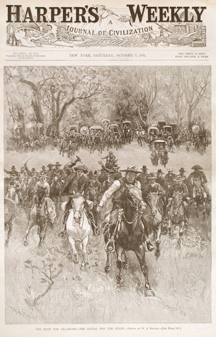 |
|
Harper's Weekly front page -- the Run |
[Seen here: front page article in Harper's Weekly with the caption reading "The rush for Oklahoma--The Signal for the Start" -- drawn by W.A. Rogers.]
It was the evening of the 21st of April when we reached the western line. Here we found a large crowd, hundreds of covered wagons all up and down the line as far as we could see, and more people still coming all the time.
The assembled throng included people of all classes and conditions of life--farmers, laborers, mechanics and professional men, and some gamblers, sharpers and adventurers. But it was a good-natured crowd and peace and good order generally prevailed.
The soldiers were riding constantly up and down the line, not allowing anyone to get within a certain distance of it.
We drove out a little ways from the crowd and made camp near a clump of cotton woods. Our journey was nearly over. We had reached the line of the promised land. It was a lovely evening and the hundreds of camp fires up and down the line, the white tents, the neighing of horses, lowing of cattle and laughter of children at play after a long trip--this and the exciting scenes of the morrow at the time of starting--made a picture that will live in the memory of those who saw it as long as life lasts.
And at 9 o’clock we heard the bugle sound “lights out” at the soldiers barracks near Kingfisher a mile and half away.
All were up early the next morning for the long-looked-for day. The 22nd of April had come at last and all were anxious to know what the future had in store for them.
Mr. Brown had decided that his daughters were to go in the one-horse buggy and drive a mule that was gentle and he didn’t think would get frightened, and Nellie was to take the first claim over the line.
The son Frank was to go horseback and Mr. Brown would wait until Nellie had taken her claim and then go in the buggy and try to find him one.
Between 9 and 10 o’clock the crowd began to line up for the race. Time dragged slowly by, it is now 10:30--11--11:30--suddenly we heard some of the boys back of us cheering and looking around to see what the commotion was. What should we see coming as swiftly as possibly down the road to the west of us but the family with the cow and horse, the old wagon and two wheeled cart. They had got there almost at the last moment, but in time. Quickly unhitched the horse the man mounted him and found a place in line, leaving the wife and children to care for the cow, and I will say right here that the old black horse proved a better runner than looker and secured for his master a fine farm a few miles southeast of Kingfisher and the last the writer heard of the family they were well and prosperous. But let us return to the girls we left standing in line.
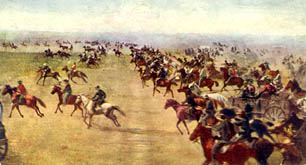 |
|
Famed painting of the start of the run |
As the time drew nearer, a quiet prevailed. All were ready with whip and spur and watching closely the movements of the soldiers who had now stopped riding and stood with their horses’ heads facing the east and the promised land, watch in hand, counting the minutes and with gun ready to fire the signal shot into the air that would start the race for homes, when it should be exactly l1 o’clock.
Suddenly there is a “Flash,” “Boom” from the soldiers’ guns and with a mighty cheer the crowd is off and away in a cloud of dust, horse-backers, in buggies, wagons, and on foot. And in less time then it takes to tell it, the crowd was over the little rise of ground to the east of us and out of sight and the sounds grew fainter and fainter and soon died away in the distance.
The mule the girls were driving needed no whip for she became frightened at the noise and confusion and it was all the girls could do to hold her. As soon as they got stopped, Nellie sprang to the ground and drove her stake with her name on it, declaring this to be her farm. Then taking a hoe from the buggy, she dug up some weeds and grass. Then spread a wagon sheet on the ground and sat down on it.
Looking up she saw that a soldier had stopped and was watching her. He laughed and pointed up and down the line and to our dismay we saw no less the 6 men doing almost the same thing taking this same farm. But as the soldier rode on he said, “Stay with it and you’ll get it, they won’t contest a woman.” And she stayed with it and got the farm.
Mr. Brown came over to where his daughters were in a few minutes and and taking the mule and buggy went in search of him a farm, leaving the girls alone. But, of course, there were lots of women and children camped along the line while their men were gone to hunt for farms.
|
|
|
Laying out lots in a typical Oklahoma town, just 20 minutes after the first arrivals -- this one was in the newly created town of Guthrie. |
After the crowd had all gone, Laura went back to where the wagons were, which was not far off, and, hitching up a team, drove back to where her sister was and they drove on a little farther up on the hill where they could watch the town of Kingfisher grow. By night it was tent city and by morning all kinds of business was going on--grocery stores, banks, barber shops, blacksmith shops, law offices, pool halls, saloons and everything that went to make up a town.
The girls pitched their tent and arranged their few household things and here they stayed on Nellie’s farm, all the long, bright afternoon.
Slowly the evening shadows lengthened. The great 22nd of April that would go down in history had come and almost gone. In the morning the country had been a vast solitude and wilderness, as it had been through the ages past. At the noon hour a surging tide of eager, earnest, excited humanity; in the evening a land of many people with many a tented town site, numbering their inhabitants by the hundreds and some by the thousand. The white tents of the settlers dotted the landscape o’er the hill, plain and valley and as the twilight shadows deepened the numberless campfires set their bright beams heavenward, as an incense of peace.
Out of the struggles of the pioneer ‘boomers’ during the last 10 years had come an era of peace and prosperity, and the rapid development of the country in a few short years almost startled the world.
The men returned late that evening and found the girls right at home with a warm supper waiting and it certainly was welcome for they were tired. hungry and discouraged. As they had found no place but what was taken, people with swifter horses than theirs had won the prize. And Nellie was the only one of our party that secured a farm on the day of the opening.
|
|
|
Head of the line outside of an Oklahoma land office on opening day |
The next morning Mr. Brown took his daughter to the town of Kingfisher to the land office to file on her claim and here as everywhere else they found a crowd. Long lines of people standing in line, waiting their turns to file on their claims, and Nellie had to stand in line two days before she could file. But the men in line ahead of her were willing for her father and brother to take turns standing in line for her and let her sit in the shade.
But good luck was with her, for she was in line ahead of any of those who were on the claim and got her filing in first and none of them contested her.
A few days later Mr. Brown went back to Kansas, leaving the young people alone to hold down the claim, but returned in a short time with the mother and younger children.
He then commenced to hunt for him a claim as he had not given up yet but what he would find one, and he did, in the timber belt about 20 miles northeast of Kingfisher, and filed on it and made settlement.
The son, Frank, got acquainted with a young man who had made settlement on a farm about 5 miles northeast of Kingfisher, but had not yet filed, and was dissatisfied and wanted to sell out his right and go back to his hold home. So Frank bought him off and filed on the claim and thus secured for himself a home.
Of the trials and hardships, joys and sorrows of their family in holding down their claims, improving them, and making a living, we will not speak here, for that would make another story. But here we will leave them, happy for the present, at least, in the possession of their homes in the new country.
Text as published in Kingfisher (OK) Times, June 25, 1986. Republished with permission of the family. Land rush sketches originally appeared in Harper's Weekly, May 18, 1889 and Oct. 3, 1891. |
|
Copyright © 2001, 2009-2010, 2015, 2017 Mark A. Miner |

